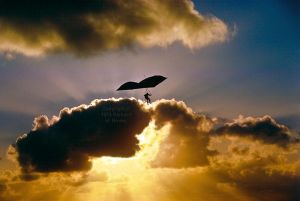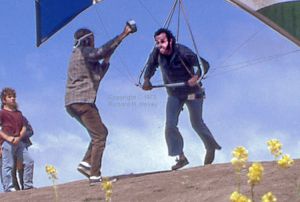Home (contents) → Chronology → Hang gliding 1973 part 2
Hang gliding 1973 part 2
This page continues from Hang gliding 1973 part 1.
School for perfection
Resting on his shoulders was a great frail set of snow-linen wings, thirty feet from tip to tip and casting a transparent shadow on the grass. He took a breath in readiness, reached forward, and gripped the adhesive-taped bar of the main wing beam. Then all at once he ran forward, tilted the wings upward, and lifted free of the hillside.
— Richard Bach, School for perfection, 1968
The Icarus II was an early rigid biplane wing hang glider designed by Taras Kiceniuk Jr, who went on to develop the Icarus V monoplane. In Canada, Val Lapsa and some friends built and flew an Icarus II.



Val’s glider eventually crashed and was unrepairable, which was one of the drawbacks of these higher performing but more complex wings.
See also Canada in Hang gliding mid 1980s and see under External links later on this page for a review of the movie Fly Away Home, featuring Icarus 2 hang gliders and powered ultralights in Canada.

While most photographers were content to have their photos published in hang gliding magazines, Richard H. Hovey spread the news of hang gliding by having his sharp color photos published in a wider spectrum of publications. They included United Airlines Mainliner in-flight magazine, Orange County magazine, Weekly Reader, Campus Life, Hang Ten’s Sporting World, Hang Ten spiral notebooks (3-ring binders, and similar), and the Thought Factory poster sold worldwide. Richard also had his photos published in the USHGA’s Ground Skimmer and in the 1974 and 1975 Skysailing calendars. Incidentally, his Mainliner and Hang Ten photos accompanied articles submitted by one Maralys Allen; the then pen name of Maralys Wills. (See Eagles among men for a review of one of her books.)
For links to more of Richard Hovey’s photos, see his entry in the Photographers of early hang gliding related topics menu.


The Icarus II was further developed by Ultralight Flying Machines (led by Larry Mauro) of Cupertino, California, and renamed Easy Riser, in which guise it became popular as a powered ultralight. The 1995 movie Fly Away Home includes film of the Icarus II, both as a glider and as a powered ultralight. See the Hang Ten Hang Gliding World Meet, Part 1 link later on this page for film of an Icarus II or its close relative, the Easy Riser.
The Icarus V, designed by Taras Kiceniuk Jr, was a monoplane development of the Icarus II biplane. Like its predecessor, it was cumbersome to transport, not being foldable like a Rogallo. Kiceniuk had help though…
In 1972 Kiceniuk entered Cal Tech and asked MacCready’s help with a design for a swept-wing monoplane that no one could dismiss as a mere ground-skimmer. MacCready encouraged him and introduced him to Peter Lissaman, who was generous with aerodynamic advice and calculations. The result of this interaction was Icarus V, a world landmark in ultralight gliders.
— from the book Gossamer Odyssey by Morton Grosser (1)



Make no mistake, the future of this sport for the serious flyer lies in the direction Kiceniuk has pioneered.
— Photographer Leroy Grannis writing in Hang Glider, Fall 1974
See the Big Blue Sky external video link farther down this page for film of the Icarus 5 and its inventor Taras Kiceniuk Jr.

Talking of the 2008 documentary Big Blue Sky, here is its creator Bill Liscomb readying to launch in a Quicksilver in the early 1970s. (For a more complete view of that design, see Quicksilver in Cronk Works.)
More Rogallos

Chris Wills, younger brother of Bob, became the first ever U.S. hang gliding champion, in 1973. Annie Green Springs was a wine label of the commercial sponsor of the competition held at Sylmar, California, in October 1973.

Although this poster is said to date from 1977, the photo is of Chris Wills at the Annie Green Springs competition in 1973.



The pilots here are Chris Wills, Tom Cher (or Gher), Ed Jens, and Kurt Kiefer. Stenciling on two of the sails reads Sport Kites Inc.–the manufacturer’s name–on one side and Wills Wing–the brand name covering all their gliders–on the other. Later, the company name was changed to Wills Wing Inc. Sport Kites manufactured about 400 of their Wills Wing standard Rogallo. See Wills Wing glider production history.


Richard used mostly a Nikkormat camera with two Vivitar lenses. He also owned a Nikon F2 but preferred the other. He often shot with both on a double strap — 28mm on one, tele on the other.
A neighbor of Richard’s in Santa Ana, California, was Jim Freeman. During college, Richard worked with Freeman and Greg MacGillivray, who were later responsible for the aerial action filming in the 1975 movie Sky Riders. The Wills brothers Bob and Chris, Chris Price, and Kurt Kiefer flew their hang gliders for that film. (See Paint it black, a review of Sky Riders.)
For links to more of Richard Hovey’s photos, see his entry in the Photographers of early hang gliding related topics menu.

Ground Skimmer was the magazine of the Southern California Hang Glider Association, which became the United States Hang Gliding Association. Dave Meyers was Art Director for Ground Skimmer during its early years. He ran West Wind School of Hang Gliding and gave beginner lessons at Dockweiler Beach off the end of the L.A. International Airport runways. He also sold hang gliders for Seagull Aircraft. (3) See also the Seagull Aircraft of Santa Monica, California, related topics menu.



The next image is a screenshot from a segment in Bill Liscomb’s 2008 documentary Big Blue Sky where Bob flies in front of crowds at the Coyote Hills near San Francisco. The glider is a Sport Kites Inc Wills Wing standard Rogallo, which he designed and built with his brother Chris Wills and their old school friend Chris Price. See the link later on this page to that part of Big Blue Sky on YouTube.

I will never forget the show Bob Wills put on at Coyote Hills Park in Milpitas, California, when he visited with his monstrous kite and awesome flying skills, effortlessly conversing with us as he soared overhead.
— Donnita Holland quoted by David Jebb in Hang Gliding & Paragliding, October 2007
In December of 1973, schoolteacher Mike Meier arrived in southern California from New York…
My interest at the time was motorcycles, and while riding along the cliffs of Palos Verdes one day I spotted two men bending over a long yellow bag with the words “Sport Kites” stenciled on the side.
— Mike Meier (2)
Mike watched as one of them flew several passes along the cliff and touched down lightly on the beach. Mike then obtained the address of Sport Kites and Bob Wills from the second man, and then he rode home.
For more about the Wills family and Mike Meier, see the related topics menu Sport Kites/Wills Wing of California.

The capacity for physical aggression in our society is more developed among males than females, and women tend to be timid with the kite, which results in failure and discouragement.
— Robin Skinner, ‘Mother Reality’ of San Diego hang gliding school Flight Realities (4)
This early prone harness has a sheepskin lining only at the hips.
Swing wing

See the related topics menu VJ day — Volmer Jensen’s hang gliders for more.



This topic continues in Hang gliding 1974 part 1.
External links
Bob Wills at Coyote Hills: Big Blue Sky by Bill Liscomb on YouTube starting at 32 minutes 59 seconds, narrated by Donnita Hall (Donnita Holland)
Brian Porter, who won this competition flying an Easy Riser in April 1976, in Hang Ten Hang Gliding World Meet, Part 1 on the Steve Morris YouTube channel, starting at 4 minutes 41 seconds
Brian Porter speed task in a UFM Easy Riser in 1976: Hang Ten Hang Gliding World Meet, Part 2 starting at 5 minutes 40 seconds
Brian Porter in the Easy Riser Hang Ten Hang Gliding World Meet, Part 3 starting at 37 seconds
Brian Porter in the Easy Riser Hang Ten Hang Gliding World Meet, Part 3 starting at 5 minutes 27 seconds
Easy riser, a review on Brave Guys and Beautiful Dolls of the movie Fly Away Home, Columbia Pictures, 1995, featuring Icarus 2 hang gliders and powered ultralights in Canada
Facebook post by William Olive with old film in Australia featuring a pilot referred to as CMac
Icarus II: Hang Ten Hang Gliding World Meet, Part 1 on YouTube starting at 6 minutes 59 seconds, where Steve Patmont carries out steep diving turns in 1976
Icarus 5 airframe on display with no fabric covering: 1975 Hang Gliding World Open – Escape Country, SoCal on H5-Phil’s YouTube channel starting at 5 minutes 26 seconds
Icarus 5: Devils Dyke Brighton Hang Glider Icarus 5: Flickr slide show of Don Liddard’s photos of an Icarus 5 taking off from the Devil’s Dyke, near Brighton, England
S.C.H.G.A. Early 1970s Archive 8mm Film by Chris Talbot-Jones on YouTube
SKYSURFERS Hang Gliding Oldies: Documentary, believed to be by the University of Toronto, Canada, on Bob Grant’s YouTube channel.
Standard Rogallo (unidentified pilot) at the Annie Green Springs competition color photo by John G. Zimmerman/Sports Illustrated on Getty Images
Taras Kiceniuk Jr: Big Blue Sky by Bill Liscomb on YouTube, starting at 34 minutes 51 seconds, for film of the Icarus 5 and its inventor
Taras Kiceniuk Jr. interview: Wings of the Wind, mid-1970s documentary by Gib Jaffe on YouTube, starting at 5 minutes 4 seconds, …while driving an open-top vintage car
Reference
1. In 1972 Kiceniuk entered Cal Tech… Post by Merlin on US Hawks forum
2. Mike Meier, Wills Wing–The Early Years in Sky Adventures, Legends and stories About the Early Days of Hang Gliding and Paragliding edited by Jim (Sky Dog) Palmieri and Maggie Palmieri, 1998
3: Dave Meyers: E-mail correspondence with the author
4: Robin Skinner quoted by Don Dedera in Hang Gliding: The Flyingest Flying by Don Dedera and Stephen McCarroll, 1975
I recall reading “School for Perfection” in Richard Bach’s book “A Gift of Wings” (a collection of magazine articles he had written) when I was a teenager, before I knew of hang gliding. That, along with the story “Egyptians are One Day Going to Fly”, seem to suggest the idea of foot launched flight. They were written in ’68 and ’70 respectively, which was concurrent with early developments. I have to say the quote you include here has a haunting, prescient quality about it.
LikeLike